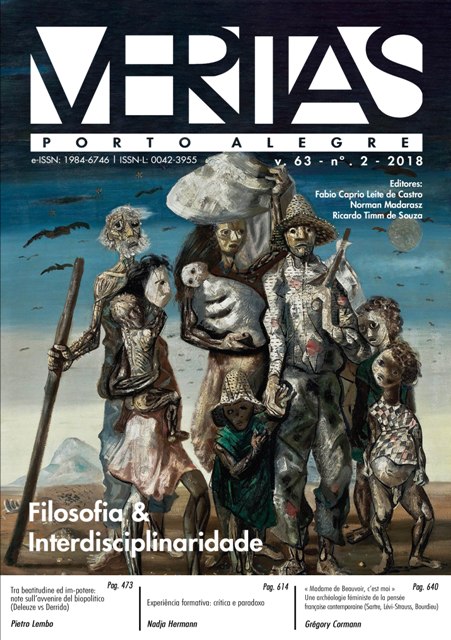Time and History by St. Augustine
DOI:
https://doi.org/10.15448/1984-6746.2018.2.28569Keywords:
providence, time, history, progress, salvationAbstract
The purpose of this essay is to present how a theological model of the philosophy of history was constituted in St. Augustine which has Divine Providence as its principle of determination, successive linear time as its form of development and salvation as its goal. For the purpose, we focus our analysis on The City of God, especially in the books of XI to XXII and the Confessions in Book XI, about time. We present the following expository strategy in our interpretation: 1st., we analyze Agostinho's understanding of the concept of time, as an internal sense in the soul and successive in its relation to eternity, set forth in Book XI of Confessions, to better understand the idea progressive linear time projected in The City of God as the guiding thread of human history; 2nd., we interpret the distinction established by the author at the origin, between two cities, that of God and the earthly one, emphasizing that there is a tension between the two, between good and evil, as a result of human free will, which may history unfold. 3rd., we consider the process of development and the ends of the two cities, narrated in the biblical perspective of the action of the great patriarchs in their relations of obedience and disobedience to God, linking to the progressive history of salvation.Downloads
References
AGOSTINHO, Santo. A Cidade de Deus: contra os pagãos. 9. ed. Tradução de Oscar Paes Leme. Bragança Paulista: Editora Universitária São Francisco, 2006.
______. Confissões. 11. ed. Trad. de J. Oliveira Santos e A. Ambrósio de Pina. Porto: Livraria Apostolado da Imprensa, 1984.
______. Sobre o Gênesis, contra os Maniqueus. In: Comentário ao Gênesis. Trad. de Agustinho Belmonte. São Paulo: Paulus, 2005. p. 499-591 (Coleção Patrística, n. 21).
______. A Trindade. 2ª ed. Trad. Agustinho Belmonte. Rev. Nair de Assis Oliveira e H. Dalbosco. São Paulo: Paulus, 1995.
______. Oevres Complètes. Bar-le-Duc. Traduites pour la première fois, sous la direction de M. Poujoulat et de M. l'abbé Raulx, Bar-le-Duc, 1864-1872. In:
http://www.abbaye-saint-benoit.ch/saints/augustin/
ARISTÓTELES. The Complete Works of Aristotle. Ed. Jonathan Barnes In 2 Vol., 6th printing. Princenton, New Jersey: Princeton University Press, 1995.
BIGNOTTO, N. O conflito das liberdades: Santo Agostinho. Síntese Nova fase. Belo Horizonte, v. 19, n. 58, 1992.
BITTNER, R. “Augustine’s Philosophy of History,” in G. B. Matthews (ed.), The Augustinian Tradition, Philosophical Traditions, [Berkeley: University of California Press, 1999.
BROWN, P. Augustine of Hippo: A Biography. Berkeley: University of California Press, 2000.
GILSON, É. Evolução da cidade de Deus. Traduzido do original, les Metamorphoses de la Cite de Dieu, por João Camilo de Oliveira Torres. São Paulo: Herder, 1965.
______. Introdução ao Estudo de Santo Agostinho. Trad. Cristiane N. Abbud Ayoud. São Paulo: Ed. Paulus e Discurso Editorial, 2007.
LÖWITH, K. O sentido da história. Trad. De Maria Georgiana Segurado. Lisboa: Edições 70, 1990.
______. Histoire et salut. Les pressuposés theologiques de la philosophie de l’histoire. Trad. de Marie-Christine Challiol-Gillet, Sylvie Hurstel, Jean-François Kevérgan, Paris, Gallimard, 2002.
RICOEUR, P. Tempo e Narrativa. Tomo I. Trad. Constança Marcondes César. Campinas, SP: Papirus, 1994.
SABINE, G.. San Agustín. In Historia de la teoria politica. Madrid: Fundo de Cultura Econômica, 1988.
Downloads
Published
How to Cite
Issue
Section
License
Copyright
The submission of originals to Revista Veritas implies the transfer by the authors of the right for publication. Authors retain copyright and grant the journal right of first publication. If the authors wish to include the same data into another publication, they must cite Revista Veritas as the site of original publication.
Creative Commons License
Except where otherwise specified, material published in this journal is licensed under a Creative Commons Attribution 4.0 International license, which allows unrestricted use, distribution and reproduction in any medium, provided the original publication is correctly cited. Copyright: © 2006-2020 EDIPUCRS</p






